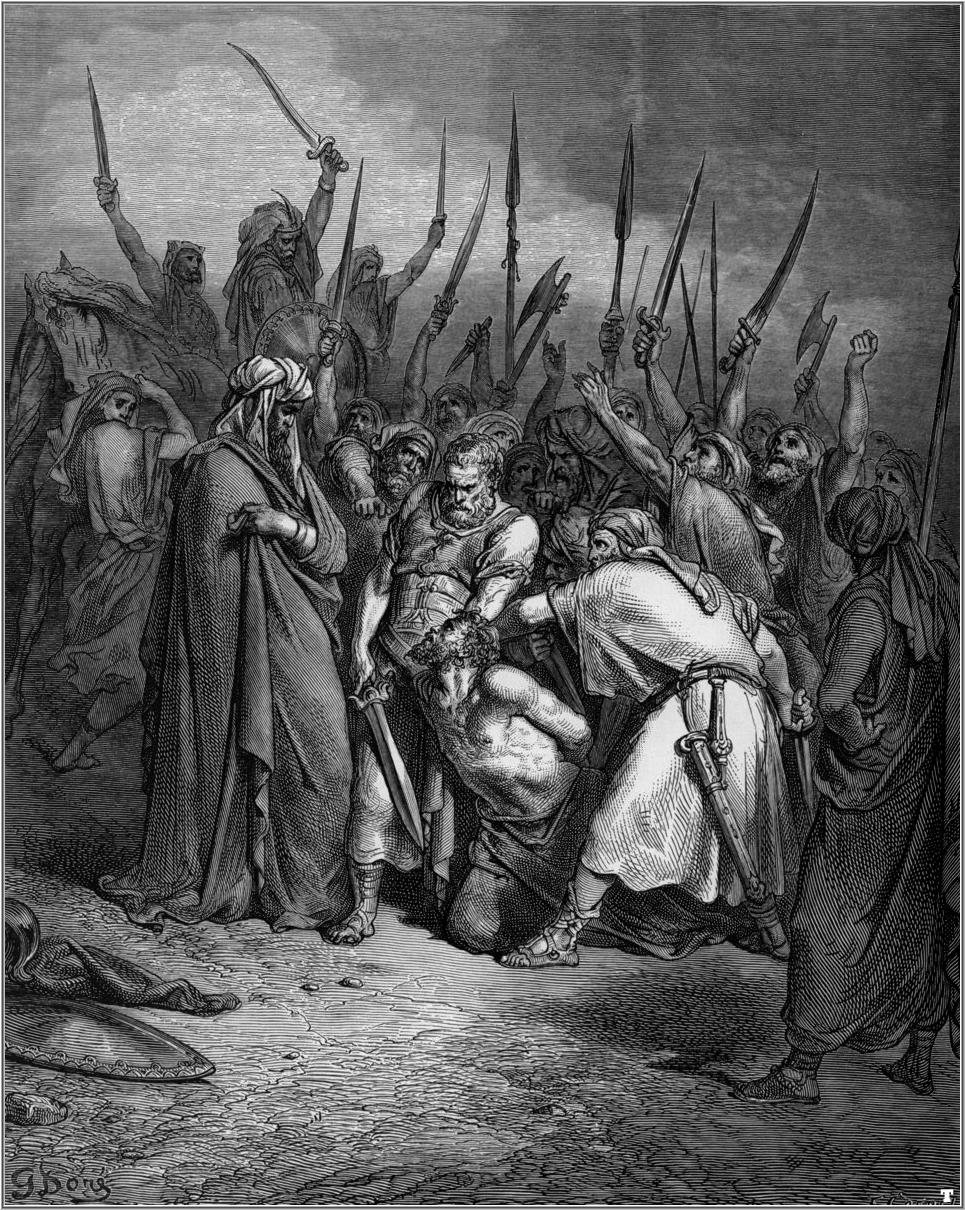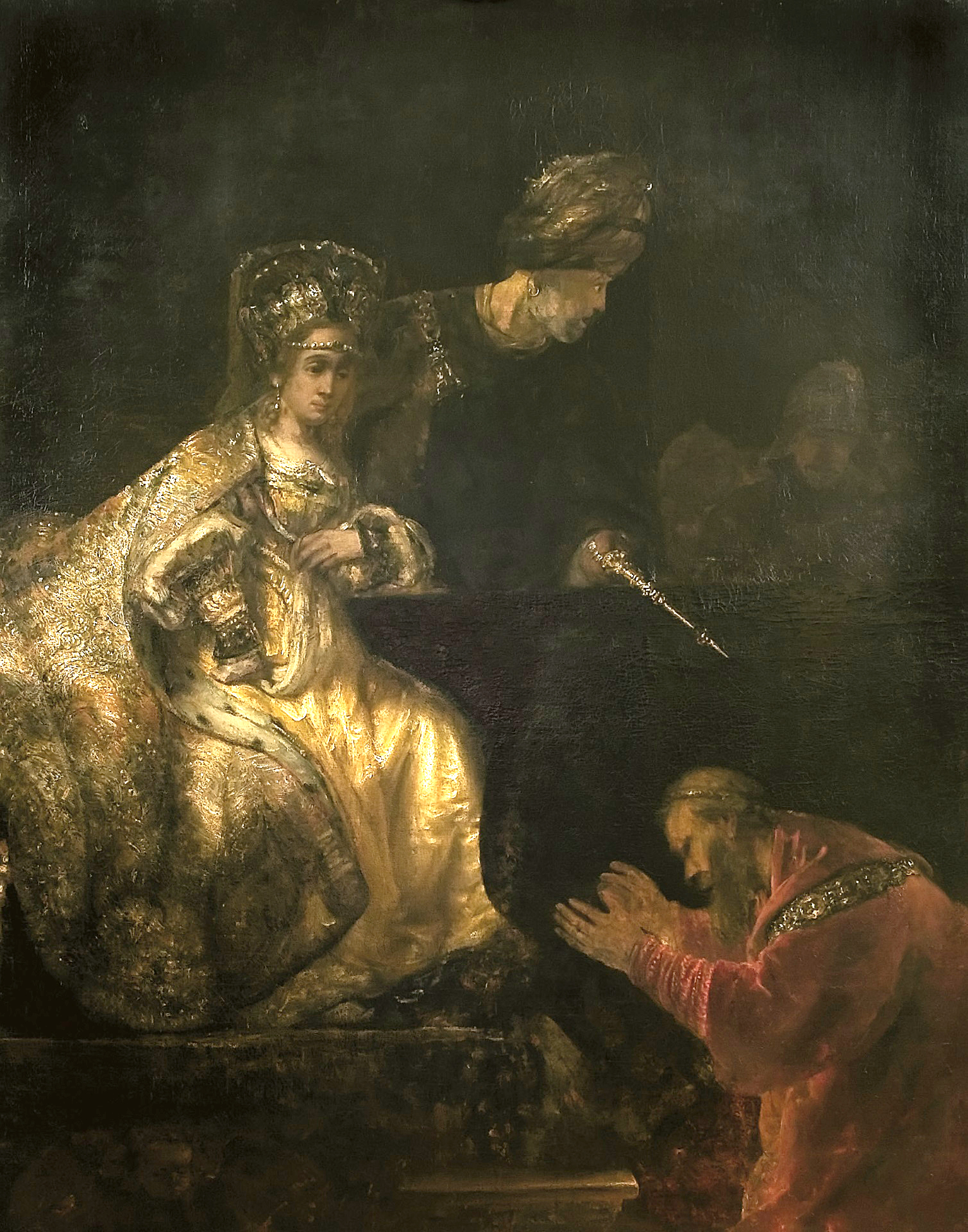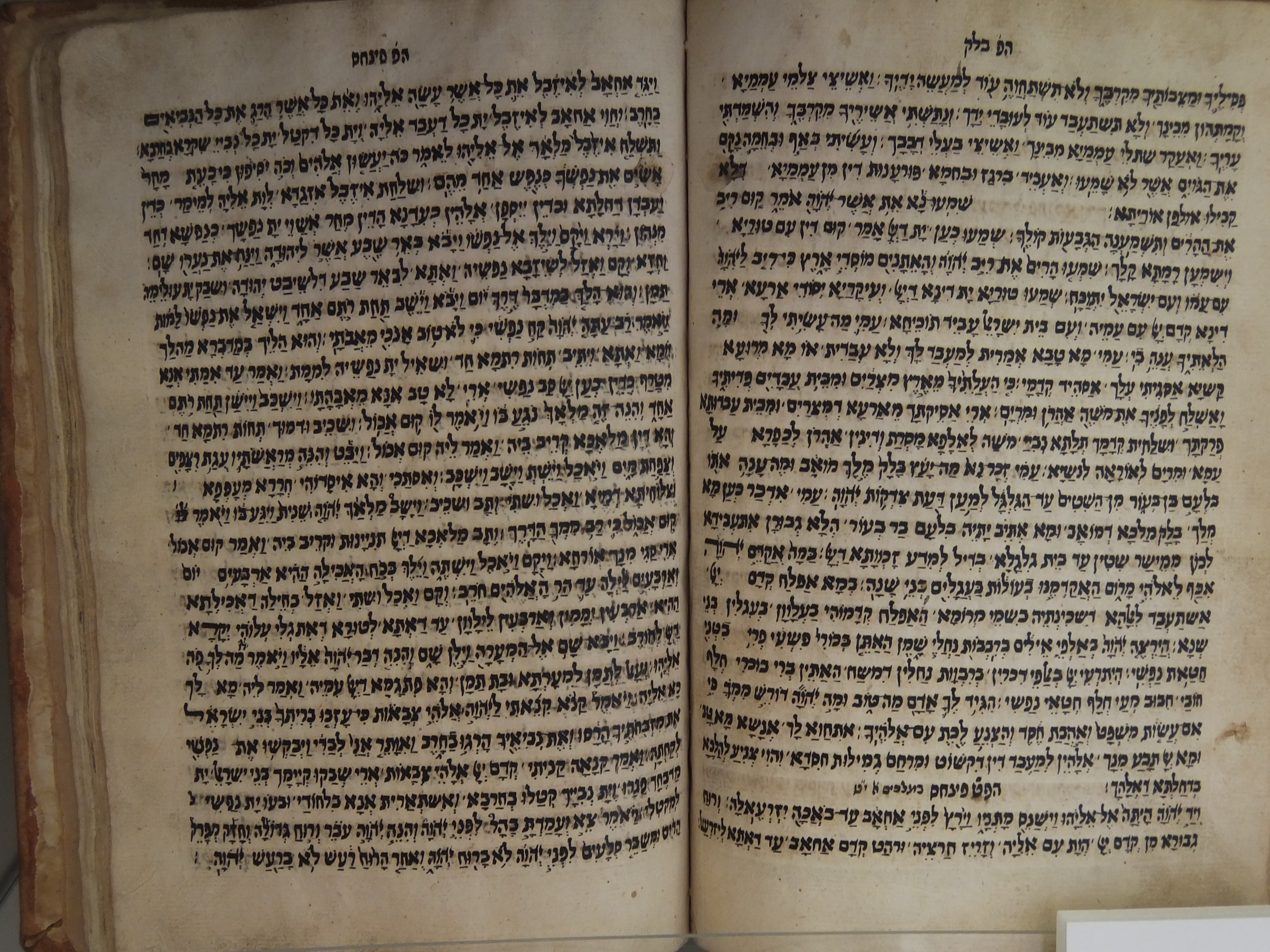|
Agag
Agag (; he, אֲגַג ''ʾĂgāg'') is a Northwest Semitic name or title applied to a biblical king. It has been suggested that "Agag" was a dynastic name of the kings of Amalek, just as Pharaoh was used as a dynastic name for the ancient Egyptians. The etymology is uncertain, according to John L. McKenzie (1995), while Cox (1884) suggested "High." In the Torah, the expression "Its king higher than Agag, and its kingdom exalted" was uttered by Balaam in Numbers 24:7, in his third prophetic utterance, to describe a king of Israel who would be higher than the king of Amalek. This is understood to mean that Israel's king would take a higher position than even Amalek himself, and would exercise a wider authority. The writer uses an allusion to the literal significance of the word "Agag", meaning "high", to convey that the king of Israel would be "higher than High". A characteristic trait of biblical poetry is to use puns. Agag also refers to the Amalekite king who survived King S ... [...More Info...] [...Related Items...] OR: [Wikipedia] [Google] [Baidu] |
Haman (Bible)
Haman ( ; also known as Haman the Agagite or Haman the evil) is the main antagonist in the Book of Esther, who according to the Hebrew Bible was an official in the court of the Persian empire under King Ahasuerus, commonly identified as Xerxes I (died 465 BCE) but traditionally equated with Artaxerxes I or Artaxerxes II. As his epithet ''Agagite'' indicates, Haman was a descendant of Agag, the king of the Amalekites. Some commentators interpret this descent to be symbolic, due to his similar personality. Retrieved 13 February 2017 Etymology and meaning of the name The name has been equated with the Persian name ''Omanes''Encyclopaedia Judaica CD-ROM Edition 1.0 1997, ''Haman'' ( peo, 𐎡𐎶𐎴𐎡𐏁, ) recorded by Greek historians. Several etymologies have been proposed for it: it has been associated with the Persian word , meaning "illustrious" (naming dictionaries typically list it as meaning "magnificent"); with the sacred drink Haoma; or with the Persian name Vohuman, me ... [...More Info...] [...Related Items...] OR: [Wikipedia] [Google] [Baidu] |
Amalek
Amalek (; he, עֲמָלֵק, , ar, عماليق ) was a nation described in the Hebrew Bible as a staunch enemy of the Israelites. The name "Amalek" can refer to the nation's founder, a grandson of Esau; his descendants, the Amalekites; or the territories of Amalek, which they inhabited. Etymology In some rabbinical interpretations, Amalek is etymologised as , 'a people who lick (blood)', but most specialists regard the origin to be unknown. Amalekites in the Hebrew Bible According to the Bible, Amalek was the son of Eliphaz (himself the son of Esau, ancestor of the Edomites) and Eliphaz's concubine Timna. Timna was a Horite and sister of Lotan. Amalek is described as the "chief of Amalek" among the "chiefs of the sons of Esau", from which it is surmised that he ruled a clan or territory named after him. The Amalekites () were considered to be Amalek's descendants through the genealogy of Esau. In the oracle of Balaam, Amalek was called the 'first of the nations'. One modern ... [...More Info...] [...Related Items...] OR: [Wikipedia] [Google] [Baidu] |
Herem (war Or Property)
''Herem'' or ''cherem'' (Hebrew: חרם, ''ḥērem''), as used in the Tanakh, means something given over to the Lord, or under a ban, and sometimes refers to things or persons to be utterly destroyed. The term has been explained in different and sometimes conflicting ways by different scholars. It has been defined as "a mode of secluding, and rendering harmless, anything imperilling the religious life of the nation", or "the total destruction of the enemy and his goods at the conclusion of a campaign", or "uncompromising consecration of property and dedication of the property to God without possibility of recall or redemption". It is translated into Latin as devotio, a word used for human sacrifice, and into Greek as anathema, which was a sacrifice to the Gods. There is a related verb, ''heḥərîm'' (החרים), meaning "to treat as ''ḥērem''", or "destroy utterly". Etymology The word comes from the semitic root ''Ḥ-R-M'' with meanings having to do with prohibiting an ... [...More Info...] [...Related Items...] OR: [Wikipedia] [Google] [Baidu] |
Balaam
Balaam (; , Standard ''Bīlʿam'' Tiberian ''Bīlʿām'') is a diviner in the Torah (Pentateuch) whose story begins in Chapter 22 of the Book of Numbers (). Ancient references to Balaam consider him a non-Israelite, a prophet, and the son of Beor. King Balak of Moab offered him money to curse Israel (), but Balaam blessed the Israelites instead, as dictated by God. Nevertheless, he is reviled as a "wicked man" in both the Torah and the New Testament (). According to the Book of Revelation (), Balaam told King Balak how to get the Israelites to commit sin by enticing them with sexual immorality and food sacrificed to idols. The Israelites fell into transgression due to these traps and God sent a deadly plague to them as a result (). Balaam and Balak The main story of Balaam occurs during the sojourn of the Israelites in the plains of Moab, east of the Jordan River, at the close of forty years of wandering, shortly before the death of Moses and the crossing of the Jordan. The I ... [...More Info...] [...Related Items...] OR: [Wikipedia] [Google] [Baidu] |
Books Of Samuel
The Book of Samuel (, ''Sefer Shmuel'') is a book in the Hebrew Bible, found as two books (1–2 Samuel) in the Old Testament. The book is part of the narrative history of Ancient Israel called the Deuteronomistic history, a series of books (Joshua, Judges, Samuel, and Kings) that constitute a theological history of the Israelites and that aim to explain God's law for Israel under the guidance of the prophets. According to Jewish tradition, the book was written by Samuel, with additions by the prophets Gad and Nathan, who together are three prophets who had appeared within 1 Chronicles during the account of David's reign. Modern scholarly thinking posits that the entire Deuteronomistic history was composed ''circa'' 630–540 BCE by combining a number of independent texts of various ages. The book begins with Samuel's birth and Yahweh's call to him as a boy. The story of the Ark of the Covenant follows. It tells of Israel's oppression by the Philistines, which brought about Sam ... [...More Info...] [...Related Items...] OR: [Wikipedia] [Google] [Baidu] |
King Saul
Saul (; he, , ; , ; ) was, according to the Hebrew Bible, the first monarch of the United Kingdom of Israel. His reign, traditionally placed in the late 11th century BCE, supposedly marked the transition of Israel and Judah from a scattered tribal society to organized statehood. The historicity of Saul and the United Kingdom of Israel is not universally accepted, as what is known of both comes from the Hebrew Bible. According to the text, he was anointed as king of the Israelites by Samuel, and reigned from Gibeah. Saul is said to have died by suicide when he "fell on his sword" during a battle with the Philistines at Mount Gilboa, in which three of his sons were also killed. The succession to his throne was contested between Ish-bosheth, his only surviving son, and David, his son-in-law; David ultimately prevailed and assumed kingship over Israel and Judah. Biblical account The biblical accounts of Saul's life are found in the Books of Samuel: House of King Saul According ... [...More Info...] [...Related Items...] OR: [Wikipedia] [Google] [Baidu] |
Mordecai
Mordecai (; also Mordechai; , IPA: ) is one of the main personalities in the Book of Esther in the Hebrew Bible. He is described as being the son of Jair, of the tribe of Benjamin. He was promoted to Vizier after Haman was killed. Biblical account Mordecai resided in Susa (Shushan or Shoushan),Esther 2:5–6 of the Bible ( New International Version): : Now there was in the citadel of Susa a Jew of the tribe of Benjamin, named Mordecai son of Jair, the son of Shimei, the son of Kish, who has been carried into exile from Jerusalem by Nebuchadnezzar king of Babylon, among those taken captive with Jeconiah king of Judah. the metropolis of Persia (now Iran). He adopted his orphaned cousin (Esther 2:7), Hadassah (Esther), whom he brought up as if she were his own daughter. When "young virgins" were sought, she was taken into the presence of King Ahasuerus and was made queen in the place of the exiled queen Vashti. Subsequently, Mordecai discovered a plot of the king's chamberlains Bi ... [...More Info...] [...Related Items...] OR: [Wikipedia] [Google] [Baidu] |
Doeg The Edomite
Doeg ( ''Dō’ēg'') was an Edomite, chief herdsman to Saul, King of Israel. He is mentioned in the Hebrew Bible book of First Samuel, chapters 21 and 22, where he is depicted as an antagonist of David responsible for the deaths of a large number of priests. Biblical account After parting from Jonathan, David fled from Saul's jealous anger and hid in Nob. He went to Ahimelech, the High Priest, claiming to be on a clandestine royal mission. Ahimelech fed David and his men with the showbread, and gave David the sword of Goliath. By doing this, David endangered Ahimelech's life, since Doeg was present ("detained before the Lord") and witnessed Ahimelech's service to David (). Later, Saul asked about the whereabouts of David, prompting Doeg to respond: :''Then answered Doeg the Edomite, which was set over the servants of Saul, and said, I saw the son of Jesse coming to Nob, to Ahimelech the son of Ahitub.'' () Therefore, Saul summoned Ahimelech and his entire company, asking hi ... [...More Info...] [...Related Items...] OR: [Wikipedia] [Google] [Baidu] |
Halakha
''Halakha'' (; he, הֲלָכָה, ), also transliterated as ''halacha'', ''halakhah'', and ''halocho'' ( ), is the collective body of Jewish religious laws which is derived from the written and Oral Torah. Halakha is based on biblical commandments ('' mitzvot''), subsequent Talmudic and rabbinic laws, and the customs and traditions which were compiled in the many books such as the ''Shulchan Aruch''. ''Halakha'' is often translated as "Jewish law", although a more literal translation of it might be "the way to behave" or "the way of walking". The word is derived from the root which means "to behave" (also "to go" or "to walk"). ''Halakha'' not only guides religious practices and beliefs, it also guides numerous aspects of day-to-day life. Historically, in the Jewish diaspora, ''halakha'' served many Jewish communities as an enforceable avenue of law – both civil and religious, since no differentiation of them exists in classical Judaism. Since the Jewish Enlightenment (''Hask ... [...More Info...] [...Related Items...] OR: [Wikipedia] [Google] [Baidu] |
Deaths By Stabbing
Death is the irreversible cessation of all biological functions that sustain an organism. For organisms with a brain, death can also be defined as the irreversible cessation of functioning of the whole brain, including brainstem, and brain death is sometimes used as a legal definition of death. The remains of a former organism normally begin to decompose shortly after death. Death is an inevitable process that eventually occurs in almost all organisms. Death is generally applied to whole organisms; the similar process seen in individual components of an organism, such as cells or tissues, is necrosis. Something that is not considered an organism, such as a virus, can be physically destroyed but is not said to die. As of the early 21st century, over 150,000 humans die each day, with ageing being by far the most common cause of death. Many cultures and religions have the idea of an afterlife, and also may hold the idea of judgement of good and bad deeds in one's life (heave ... [...More Info...] [...Related Items...] OR: [Wikipedia] [Google] [Baidu] |
Monarchs Of The Hebrew Bible
A monarch is a head of stateWebster's II New College DictionarMonarch Houghton Mifflin. Boston. 2001. p. 707. for life or until abdication, and therefore the head of state of a monarchy. A monarch may exercise the highest authority and power in the state, or others may wield that power on behalf of the monarch. Usually a monarch either personally inherits the lawful right to exercise the state's sovereign rights (often referred to as ''the throne'' or ''the crown'') or is selected by an established process from a family or cohort eligible to provide the nation's monarch. Alternatively, an individual may proclaim themself monarch, which may be backed and legitimated through acclamation, right of conquest or a combination of means. If a young child is crowned the monarch, then a regent is often appointed to govern until the monarch reaches the requisite adult age to rule. Monarchs' actual powers vary from one monarchy to another and in different eras; on one extreme, they may ... [...More Info...] [...Related Items...] OR: [Wikipedia] [Google] [Baidu] |
Haftarah
The ''haftara'' or (in Ashkenazic pronunciation) ''haftorah'' (alt. ''haftarah, haphtara'', he, הפטרה) "parting," "taking leave", (plural form: ''haftarot'' or ''haftoros'') is a series of selections from the books of ''Nevi'im'' ("Prophets") of the Hebrew Bible (''Tanakh'') that is publicly read in synagogue as part of Jewish religious practice. The ''haftara'' reading follows the Torah reading on each Sabbath and on Jewish festivals and ta'anit, fast days. Typically, the ''haftara'' is thematically linked to the ''parashah'' (weekly Torah portion) that precedes it. The ''haftara'' is sung in a chant. (Chanting of Biblical texts is known as "''trope''" in Yiddish or "Cantillation" in English.) Related blessings precede and follow the haftara reading. The origin of haftara reading is lost to history, and several theories have been proposed to explain its role in Jewish practice, suggesting it arose in response to the persecution of the Jews under Antiochus IV Epiphane ... [...More Info...] [...Related Items...] OR: [Wikipedia] [Google] [Baidu] |







